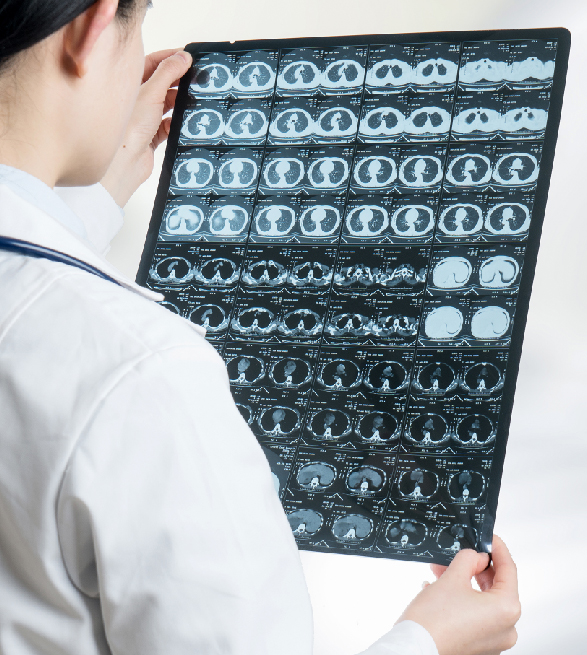
PET-CT detects bodily changes at cellular and molecular level to identify early onset of diseases, like cancer. PET-CT is more efficient than other imaging tests. PET provides functional data and CT provides quality anatomical images. PET-CT uses small amounts of radioactive materials called radiotracers or dye, a special camera and a computer for accurate diagnosis. Commonly used dyes include 18F-FDG, 68Ga-PSMA, 18F-DOPA and 18F-PSMA. PET-CT is recommended for staging the disease, understanding therapy response, detecting recurrence early and routine follow-ups after treatment. With a combined experience of reporting 2,00,000 PET-CT Scans in the past 10 years, we strive to provide affordable, accurate, and timely PET-CT scans. We provide high-quality PET-CT imaging services across India at affordable costs.
Prem Nagar, Hazratganj, Lucknow, Uttar Pradesh 226001
Baroda Imaging Centre, 2nd Floor, Yuvraj Mahalay, Bhadralok Tower-G, Old Padra Road, Vadodara, Gujarat 390020.
C/O Sai Hi-Tech Diagnostic Center, G8/9, Ground Floor, Suyojit City Centre, B wing, Mumbai Naka, Nashik – 422001.
Zircon-BIC imaging center 2/871-B, Oasis Building, Jay Prakash Narayan Marg Hiramodi Sheri, Opposite Sub-Jail Sagrampura Surat Gujarat 395002.
1st floor, Vidisha Building, Natakwala Lane, Opp. Hdfc Bank, S V Road, Borivali West, Mumbai 400092
12/19, Ground Floor, Prabhadevi Industrial Estate, Veer Savarkar Marg, Prabhadevi, Mumbai - 400025
1-9-645, Vidyanagar, Hyderabad, Telangana -500044
Samanvitha Complex, Mayura Street, BBMP, Ring Road, Hebbal, Bangalore, Karnataka - 560094.
Ground Floor, Plot No. 1, Malhan Business Center, Sunlight Colony-2, Ashram, New Delhi - 110014
Apeejay Business Centre, Plot No.87, Sector 17, Vashi, Navi Mumbai, Maharashtra, 400708.
Absorbed dye then gives out radiation, which is detected by the machine, which captures pictures. These images exhibit the movement of dye inside the body. If dye builds up in a place, it indicates disease. The scan is completely painless and noninvasive. In case of vomiting sensation or giddiness, inform the staff immediately.
If you have any concern! contact us
Contact UsFor high-quality cancer imaging
A PET scan captures images of your organs and tissues in action using a safe injectable radioactive chemical (radiotracer) and a PET scanner. Diseased cells absorb radiotracer and are captured by a scanner, indicating potential health problems. Healthcare providers commonly employ PET scans for cancer diagnosis and treatment evaluation. They are also useful for assessing specific heart and brain conditions.
A PET scan indicates:
A PET scan measures essential functions within the body, including blood flow, oxygen utilisation, and glucose metabolism. Additionally, it can identify organs and tissues that may not be functioning optimally.
Your healthcare provider recommends this scan when he/she suspects cancer. It is also recommended during treatment and follow-up sessions to:
If you have heart issues, take the scan to:
In neurological health issues, PET scan is recommended to evaluate possible brain abnormalities, such as tumours, seizures and other central nervous system conditions.
Radiotracer is injected into a vein. Fluorodeoxyglucose (FDG) is a commonly used radiotracer. You may also get an IV injection of a contrast dye that helps produce sharper CT images. Cancerous cells absorb FDG. The patient is then imaged on a PET scanner. The scan locates malignant lesions called hotspots and produces images of the affected tissue. PET scan detects cellular-molecular activities within your body to help with accurate diagnosis at an early stage.
Your healthcare provider will give you detailed instructions on how to prepare for the scan. In general, you should:
The complete PET scan procedure takes around 2 hours - 1 hour for your body to absorb the radiotracer + 30 minutes inside the scanner + waiting after the test as the technician checks the scans to verify the photos are clear.
PET scans are safe and rarely cause problems, often in the following situations:
You will receive the reports usually in 24-48 hours.